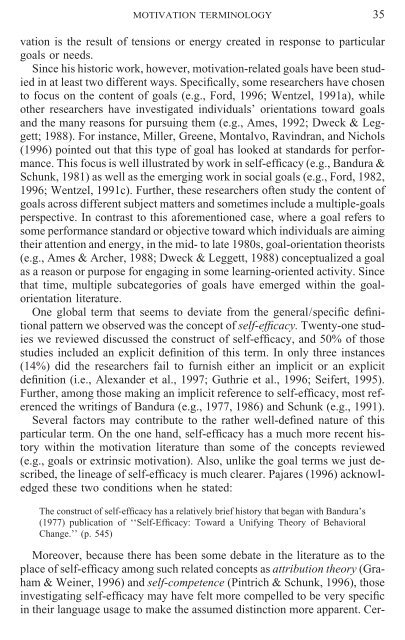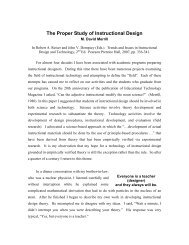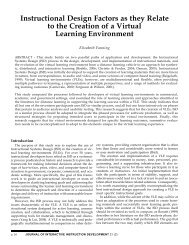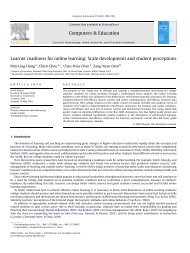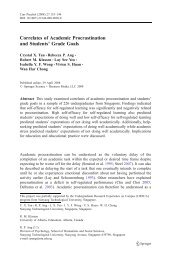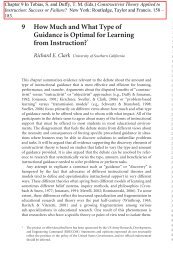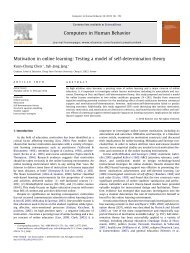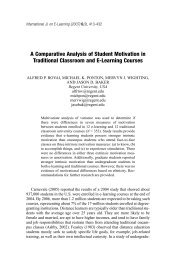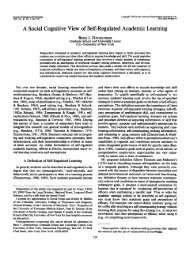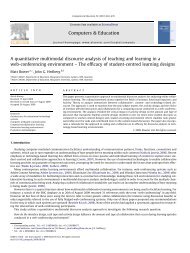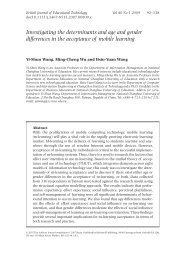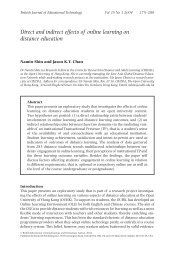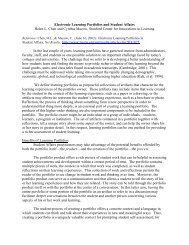A Motivated Exploration of Motivation Terminology - Anitacrawley.net
A Motivated Exploration of Motivation Terminology - Anitacrawley.net
A Motivated Exploration of Motivation Terminology - Anitacrawley.net
You also want an ePaper? Increase the reach of your titles
YUMPU automatically turns print PDFs into web optimized ePapers that Google loves.
MOTIVATION TERMINOLOGY 35vation is the result <strong>of</strong> tensions or energy created in response to particulargoals or needs.Since his historic work, however, motivation-related goals have been studiedin at least two different ways. Specifically, some researchers have chosento focus on the content <strong>of</strong> goals (e.g., Ford, 1996; Wentzel, 1991a), whileother researchers have investigated individuals’ orientations toward goalsand the many reasons for pursuing them (e.g., Ames, 1992; Dweck & Leggett;1988). For instance, Miller, Greene, Montalvo, Ravindran, and Nichols(1996) pointed out that this type <strong>of</strong> goal has looked at standards for performance.This focus is well illustrated by work in self-efficacy (e.g., Bandura &Schunk, 1981) as well as the emerging work in social goals (e.g., Ford, 1982,1996; Wentzel, 1991c). Further, these researchers <strong>of</strong>ten study the content <strong>of</strong>goals across different subject matters and sometimes include a multiple-goalsperspective. In contrast to this aforementioned case, where a goal refers tosome performance standard or objective toward which individuals are aimingtheir attention and energy, in the mid- to late 1980s, goal-orientation theorists(e.g., Ames & Archer, 1988; Dweck & Leggett, 1988) conceptualized a goalas a reason or purpose for engaging in some learning-oriented activity. Sincethat time, multiple subcategories <strong>of</strong> goals have emerged within the goalorientationliterature.One global term that seems to deviate from the general/specific definitionalpattern we observed was the concept <strong>of</strong> self-efficacy. Twenty-one studieswe reviewed discussed the construct <strong>of</strong> self-efficacy, and 50% <strong>of</strong> thosestudies included an explicit definition <strong>of</strong> this term. In only three instances(14%) did the researchers fail to furnish either an implicit or an explicitdefinition (i.e., Alexander et al., 1997; Guthrie et al., 1996; Seifert, 1995).Further, among those making an implicit reference to self-efficacy, most referencedthe writings <strong>of</strong> Bandura (e.g., 1977, 1986) and Schunk (e.g., 1991).Several factors may contribute to the rather well-defined nature <strong>of</strong> thisparticular term. On the one hand, self-efficacy has a much more recent historywithin the motivation literature than some <strong>of</strong> the concepts reviewed(e.g., goals or extrinsic motivation). Also, unlike the goal terms we just described,the lineage <strong>of</strong> self-efficacy is much clearer. Pajares (1996) acknowledgedthese two conditions when he stated:The construct <strong>of</strong> self-efficacy has a relatively brief history that began with Bandura’s(1977) publication <strong>of</strong> ‘‘Self-Efficacy: Toward a Unifying Theory <strong>of</strong> BehavioralChange.’’ (p. 545)Moreover, because there has been some debate in the literature as to theplace <strong>of</strong> self-efficacy among such related concepts as attribution theory (Graham& Weiner, 1996) and self-competence (Pintrich & Schunk, 1996), thoseinvestigating self-efficacy may have felt more compelled to be very specificin their language usage to make the assumed distinction more apparent. Cer-


